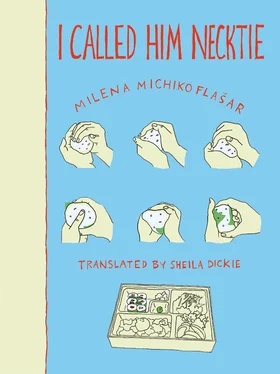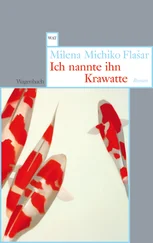57
He blushed.
His blush was not that of a young man who speaks of his first love. It was the blush of a man grown old, who bows before the first and last love of his life. It was a serene blush. It shimmered through his slack skin and lit up the whole space around us for several seconds. I blushed with him. A crackling. A whirring. The record had ended. Someone shouted: Let’s have Billie Holiday again! Murmurs of agreement, toasts to that across the tables.
Isn’t it strange? I had fallen in love with Kyōko’s Fool more than anything else. With her direct, open gaze. It saw through me. I wanted her to see through me.
But it was hard. Whenever we met she went in a different direction. I believe she didn’t know where to go. She simply set off, not really in the hope of getting anywhere, but for the pure joy of going. I am a plant, she said, I need fire, earth, water. Otherwise I will be stunted. And: Is marriage not such a stunting? The fire goes out. The wind grows weak. The earth dries out. The water dwindles. I would die. You too. She tossed her hair over her shoulders. Purple lavender. And what if it wasn’t like that, I argued. What if the daily routine, our daily routine, is my promise to you? Your toothbrush next to mine. You get annoyed because I’ve forgotten to turn the light off in the bathroom. We choose wallpaper we think is horrible a year later. You tell me I’m getting a belly. Your forgetfulness. You’ve left your umbrella somewhere again. I snore, you can’t sleep. In my dream I whisper your name. Kyōko. You tie my tie. Wave goodbye to me as I go to work. I think: you are like a fluttering flag. I think it with a stabbing pain in my heart. For Heaven’s sake, is that not enough? Is that not enough to be happy? She turned away: Give me time. I’ll think about it.
58
I waited. A whole month. Then at last a letter came. Her handwriting. Round. She had put in pressed flowers. My answer is Yes, I read: Yes, I would like to lose a thousand umbrellas, so long as you do not get a belly. I wrote back. Awkwardly. Let’s go and choose wallpaper.
That’s her. My wife. He pulled a photo out of his wallet. My first thought was: Mother. My second: She wants to make up for it. She wants to cry.
Our wedding, he went on, took place in a Shinto shrine. Okada-san was there with a guilty smirk on her face. No more doubts: She was an unfriendly, an extremely unfriendly person. I’m sorry, she wanted to say. Instead she said, like hardening wax: May your happiness be everlasting! Kyōko thanked her with an innocent laugh: What is everlasting? We are fireworks. Glowing bright and fading, we scatter sparks that soon die out.
Black coffee. A jug of milk. Two cubes of sugar. Slow stirring. Draining the spoon. He put it down carefully. Our first morning. Like coffee with milk and sugar. I woke up, Kyōko wasn’t there. Her pillow was indented, a hair stuck on the fabric. The sheet was still warm, I pushed my hand under the cover. From the kitchen came the sound of brewing from our coffee machine, a wedding present. I padded barefoot through the hall. I stopped by the gap in the doorway, saw only as much as was to be seen through it. Her back, gently bent over the stove. Sizzling pan. Her finger in a bowl. Quickly tasting. A pinch of salt, some pepper. She sneezed. As she sneezed she turned around. Her voice a bright bell: Breakfast is ready. On the counter, wrapped in a blue cloth, the bento box. For you. She added an apple. A still life.
And that too was a decision.
I once heard it said that the first morning together is of lasting significance. It is a commitment. It establishes who gets up first, who makes coffee, who prepares breakfast. Kyōko could just as well have stayed in bed, turned away and muttered: Buy yourself something on the way. The decision was what took my breath away, there by the gap in the doorway: I would not have loved her any less if she had.
59
We postponed our honeymoon. At that time all hands were needed in the firm, and you know how it is, we never got around to rearranging it. The old travel guides, Paris, Rome, London, covered in dust. A little while ago I found them again at the bottom of the bookcase. Dog-eared, notes here and there. Kyōko had marked all the sights she wanted to see with a felt tip pen. The Eiffel Tower, the Colosseum, Tower Bridge. Nothing but hearts. On one page I came upon a drawing, a portrait of me: Tetsu smoking on Montmartre, written underneath. She’d captured me well. The top button of the shirt open. Wind in my hair. Gaze directed into the distance. My younger self. It spoke to me. It looked fine to me, and I shut the book with a bang.
Who could I have become.
Who had I become.
Who will I be when she finds out who I am.
She’s just waiting until I bow my head before her: You were right. There is no such thing as a happy working day. You must strive for it afresh every morning. He coughed a little. The ashtray stood full to the brim between us. We never even made it to Miyajima*.
60
Miyajima. A catchword. He repeated it: Miyajima. What was her name now? Was it Yuriko? Yukiho? It’s on the tip of my tongue. Yukiko? Yes? So, the snow child. Please tell me about her. It would be fine by me to shut my eyes and just listen. It’s easier to talk when you’re not being looked at. Easier to hear without seeing. He took a deep breath. Then he leaned back and closed his eyes.
The Miyajimas were our neighbors, I began. Their house right next to ours. As a little boy, I was eight years old, I would often ring the doorbell and ask for Yukiko. She was the only child my age in the neighborhood, and although my parents did not like hers, they said you couldn’t tell where they were from, they accepted that we two, only children after all, played with each other now and then in front of the temple a few blocks away. Too many words in one sentence. I know. Too many words that can’t express how comfortable we were, she and I, in a world where differences matter. Where a single word can be enough to separate one from another.
I would ring the doorbell, I say. Yukiko’s mother would stick her head out and croak: She’ll be right there. The door would close and after a few minutes open again. A musty smell every time it opened and closed, a musty smell on Yukiko’s clothing. She wore a blouse, dirty frills, a skirt that was too big for her, tied around her hips with parcel string. On one of her shoes the lace was broken. Poor girl, I heard people say, as we zoomed past them, drowned out by Yukiko’s laughter: Today we’re going to fly! She spread her arms and flew ahead of me, up to the crooked pine tree where she folded her wings around its trunk. With one ear against the tree she chirped: It just grew a millimeter.
61
They were fantastic days. I mean, really, we were flying. The temple grounds were heaven, we raced over them. We picked flowers and laid them on unknown graves. Caught cicadas. Butterflies. Dragonflies. Let them go as soon as we had caught them. Freed ourselves. When it was hot we poured bowls of water over our arms and legs. Bitten by mosquitoes. Chased the temple cat. Listened in on the monk’s sleepy singing. He was a dark man with a hump back. Sometimes he turned around towards us. Then he called out: Buddha’s children. And threw a candy for each of us. That’s what enlightenment tastes like, so sweet.
At home I seldom spoke of Yukiko. If I was questioned about her, I felt it was not out of interest, but out of a certain anxiety. You need to know who you are mixing with. And: The company you keep affects you, whether it’s good or bad. With such maxims she let me go and as I ran off, it felt as if someone had grabbed me roughly. Whether it was mother’s tone of voice, the face she made when the talk was of the Miyajimas, something told me that it was dangerous to give too much away. And so I kept it to myself that there were two buttons missing on Yukiko’s jacket, and so I kept it to myself, that it did not matter at all to me.
Читать дальше












